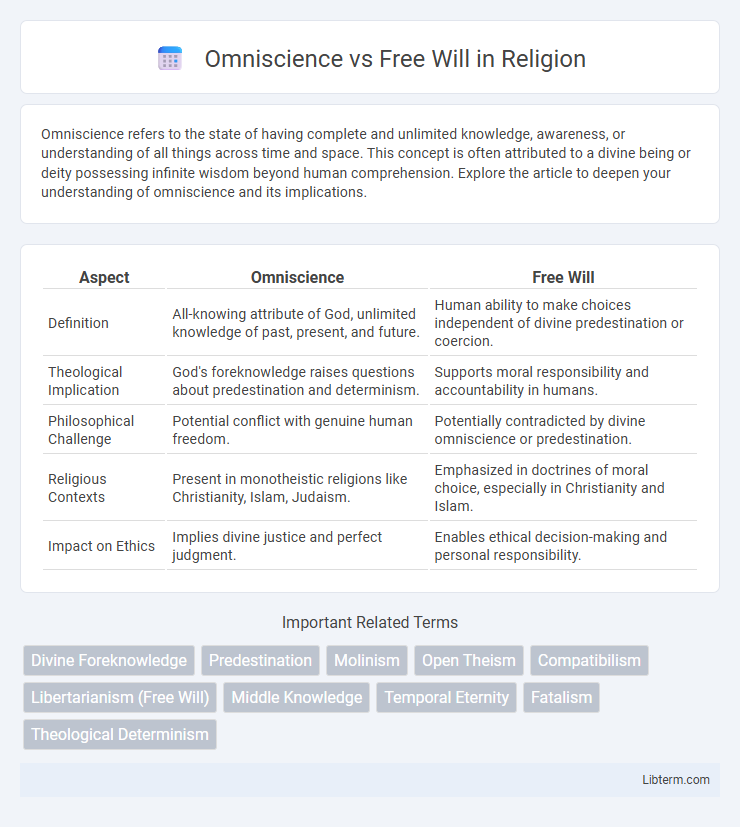Omniscience refers to the state of having complete and unlimited knowledge, awareness, or understanding of all things across time and space. This concept is often attributed to a divine being or deity possessing infinite wisdom beyond human comprehension. Explore the article to deepen your understanding of omniscience and its implications.
Table of Comparison
| Aspect | Omniscience | Free Will |
|---|---|---|
| Definition | All-knowing attribute of God, unlimited knowledge of past, present, and future. | Human ability to make choices independent of divine predestination or coercion. |
| Theological Implication | God's foreknowledge raises questions about predestination and determinism. | Supports moral responsibility and accountability in humans. |
| Philosophical Challenge | Potential conflict with genuine human freedom. | Potentially contradicted by divine omniscience or predestination. |
| Religious Contexts | Present in monotheistic religions like Christianity, Islam, Judaism. | Emphasized in doctrines of moral choice, especially in Christianity and Islam. |
| Impact on Ethics | Implies divine justice and perfect judgment. | Enables ethical decision-making and personal responsibility. |
Introduction to Omniscience and Free Will
Omniscience refers to the attribute of having complete, unlimited knowledge of all events, past, present, and future. Free will is the ability of individuals to make choices unconstrained by external determinism or divine predestination. The philosophical debate centers on whether true free will can exist in a universe governed by an omniscient being who knows every outcome in advance.
Defining Omniscience: All-Knowing Perspective
Omniscience refers to the state of having complete and infinite knowledge of all things, including past, present, and future events. This all-knowing perspective implies a comprehensive awareness of every possible outcome and decision, challenging the traditional notion of free will. The tension arises because if an entity already knows every choice a person will make, it questions whether individuals truly possess autonomous decision-making abilities.
Understanding the Concept of Free Will
Free will is the ability of individuals to make choices unconstrained by external forces or predetermination, emphasizing personal autonomy and moral responsibility. It is often contrasted with the concept of omniscience, where a divine or all-knowing entity possesses complete knowledge of past, present, and future events. Understanding free will involves examining how human decision-making operates within or against the framework of predetermined knowledge and the implications for ethical accountability.
Philosophical Roots: History of the Debate
The philosophical roots of the Omniscience vs Free Will debate trace back to classical antiquity with thinkers like Augustine and Boethius exploring God's foreknowledge and human freedom. Scholastic philosophers such as Thomas Aquinas further developed the discourse by attempting to reconcile divine omniscience with moral responsibility. This ongoing debate hinges on the tension between predestination and autonomy, influencing theological and metaphysical frameworks throughout history.
Logical Tensions: Can Omniscience Coexist With Free Will?
The logical tension between omniscience and free will centers on whether foreknowledge of choices constrains genuine freedom. If an omniscient being knows all future decisions, the predetermined knowledge seemingly negates the possibility of alternate outcomes, challenging the essence of free will. Philosophical debates explore whether foreknowledge implies causation or if knowledge itself can coexist with autonomous decision-making without contradiction.
Religious Perspectives on Omniscience and Human Choice
Religious perspectives on omniscience often depict God as possessing complete and perfect knowledge of past, present, and future events, raising complex debates about the compatibility with human free will. In many theological frameworks, God's omniscience includes foreknowledge of human choices without necessarily causing or determining those choices, preserving the notion of genuine human agency. The tension between divine omniscience and free will remains a pivotal discourse in philosophy of religion, with varying interpretations ranging from compatibilism to libertarian freedom.
Scientific Views: Neuroscience and Determinism
Neuroscience research reveals that brain activity predicting decisions occurs before conscious awareness, challenging the notion of free will. Determinism posits that all events, including human actions, are determined by prior states of the brain and environment, minimizing the scope for genuine choice. This scientific perspective suggests that omniscience, if it includes complete knowledge of brain states, would imply that free will is an illusion molded by neural determinism.
Ethical Implications of Omniscience vs Free Will
The ethical implications of omniscience versus free will center on the balance between moral responsibility and predetermination, as an all-knowing entity's foreknowledge may challenge the authenticity of human choice. If omniscience implies that all actions and decisions are predetermined, the concept of free will becomes questionable, raising concerns about accountability and justice. This tension demands reevaluation of ethical frameworks, ensuring they accommodate both divine knowledge and individual autonomy in moral decision-making.
Real-World Applications and Thought Experiments
Omniscience versus free will presents critical challenges in legal responsibility and ethical decision-making, where predicting outcomes often intersects with personal autonomy. Thought experiments such as the "Divine Foreknowledge Paradox" illuminate tensions between predetermined knowledge and human agency, influencing AI development and predictive analytics in real-world contexts. These frameworks assist in constructing models for moral accountability and enhancing algorithms that simulate human-like decision processes under conditions of uncertainty.
Conclusion: Navigating the Paradox
Navigating the paradox of omniscience versus free will requires reconciling the concept of an all-knowing entity with human autonomy, suggesting that foreknowledge does not necessarily negate free choice. Philosophers propose that divine omniscience encompasses knowledge of all possible outcomes, allowing individuals to exercise genuine free will within predetermined frameworks. This nuanced understanding helps bridge the gap between deterministic knowledge and moral responsibility, maintaining coherence in theological and philosophical discourse.
Omniscience Infographic

 libterm.com
libterm.com